DON'T TRUST ONLY YOUR MEMORY:
![]()
Reading through the first draft of my first novel, I realized that I had repeated background information up to three times! I had no idea I was doing this until I was already done writing the draft. Although Scrivener, which is a software tool for authors, has lots of tips, tricks and gadgets that are designed to help authors in every stage of writing, there was no way to check background info that was designed into the software.
What I learned the hard way was that I cannot trust my memory on what information I have written into the story. After my 8th novel, I have now devised a strategy that helps me eliminate that problem and am passing it on.
I make up a separate document inside scrivener where I track this background and descriptive information. Or if you are old school, you can write a list in pen and paper keeping track of the information as you add it into the book.
HOW I KEEP TRACK OF BACKGROUND INFORMATION:
Technique 1: Keep Track of Background and Descriptions As You Write:
The first one is to keep a separate document with a table containing 2 columns. The left column has a notation regarding the background information or character description. The right column, I put in what chapter I have that information in.
TABLE DOCUMENT EXAMPLE:
| Background & Descriptions | Chapter Number |
| Physical description of Hero | Chapter 1 |
| Description of job history | Chapter 4 |
| Reference to past case (for series info) | Chapter 10 |
The only drawback to this technique is interrupting the creative process. I was stopping while writing to record the background info, etc. I did this for a while, but that's when I found Technique 2 which I describe below. That one worked better for me. You can pick which one you would like better.
Because I work with a plot outline, I write the entire story going from scene to scene to scene in Scrivener. I write using Day 1, Day 2, etc. instead of Chapters. This allows me to carefully watch my storyline and timeline together. Like I said above, I write the first draft and never look back. (You see how I like to repeat things!) I only re-read in order to "get my bearings" between writing sessions.
Technique 2: Begin Tracking Background after first Draft:
I stopped interrupting myself during the draft writing stage and paid no real mind to the background and descriptions. I added them as I was writing and kept moving. Then, after the draft is done, I shift into reading for context, to make sure the story is all there and all the dots connect.
This is the point where I begin tracking and checking on the background and descriptive info. This is the point where I made the table document and begin tracking the background and descriptions. If I have repeated something -- and I always do -- I remove it in one of the chapters.
This way, you can keep track of all of the background and other crucial info that you need to track. By putting it off until after the draft is finished, you prevent yourself from having to stop the creative writing process.
This is the technique I use now all the time. I wait until I've even set up with Chapters and I'm reading for context. That's where I start checking on the descriptions and background info and anything else I want to keep my eye out for. Any repetition comes out easily in this stage.
WRITING A SERIES BACKGROUND:
This same technique works with writing a series. I write each book as a stand-alone as well as being a numbered book in the series. This means I have to include background information as well as series information in each of the novels, without spoiling the surprise if they read the novels out of order. Some surprises can't be helped, but some can be hidden.
I make a list of all of the facts and background information the reader of Book 4 would need to read the stand-alone in context. I print out this list and as I begin to read through the novel for context (after the draft is done), that's when I check off and make sure all of the needed information has been included throughout the book.

 In my humble opinion, writing mysteries requires a bit more planning than a novel about other subjects. You have to manage character arcs, crime arcs, clue dropping, red herrings, passage of time, as well as add pressure and suspense into the mix. This is a lot for a new writer.
In my humble opinion, writing mysteries requires a bit more planning than a novel about other subjects. You have to manage character arcs, crime arcs, clue dropping, red herrings, passage of time, as well as add pressure and suspense into the mix. This is a lot for a new writer. In my first few novels, I would start off with a loosely-planned outline in order to give the characters space to organically develop. I had noticed within the first novel that the characters did develop their own voice and personalities. I thought this open template would give me the leeway to let the novel sort of write itself. It didn't.
In my first few novels, I would start off with a loosely-planned outline in order to give the characters space to organically develop. I had noticed within the first novel that the characters did develop their own voice and personalities. I thought this open template would give me the leeway to let the novel sort of write itself. It didn't. There have been times when a better story did strike me during the writing process. I can go with the new direction, but I must alter my outline so that the new ending is the new destination. I rewrite my outline of how it will end so I will have the self-confidence that I still know where I'm going.
There have been times when a better story did strike me during the writing process. I can go with the new direction, but I must alter my outline so that the new ending is the new destination. I rewrite my outline of how it will end so I will have the self-confidence that I still know where I'm going.
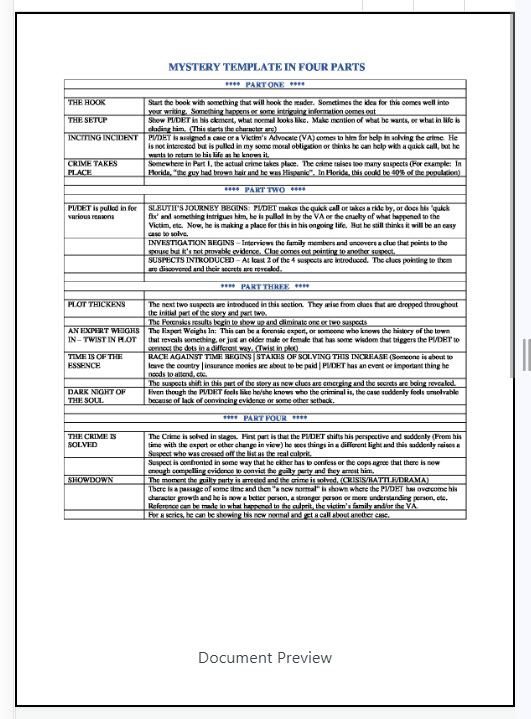
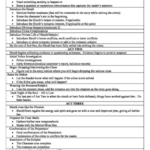 There are probably hundreds of templates out there for you to choose from. If you search "writing template" at images.google.com, you will find hundreds of them. I incorporated several of them into my own custom Mystery Template. You can
There are probably hundreds of templates out there for you to choose from. If you search "writing template" at images.google.com, you will find hundreds of them. I incorporated several of them into my own custom Mystery Template. You can 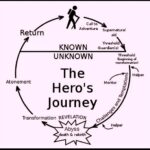 As a new writer, I watched hundreds of new writer videos and read any number of how-to articles. Everyone referenced the Hero's Journey. All the experts claimed that all stories fit within this template and this would keep a newbie on track.
As a new writer, I watched hundreds of new writer videos and read any number of how-to articles. Everyone referenced the Hero's Journey. All the experts claimed that all stories fit within this template and this would keep a newbie on track.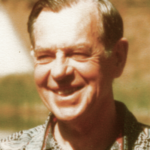 first popularized this 'hero's journey'. If I remember the series of talks correctly, his specialty or his great love was that of mythology. Now, mythology, if I remember from my one course in school, was all based on quests and heroics of some sort. So I do see how mythology fits into the hero's journey. I just can't get how it pertains to crime mysteries, mystery romance or psychological mysteries.
first popularized this 'hero's journey'. If I remember the series of talks correctly, his specialty or his great love was that of mythology. Now, mythology, if I remember from my one course in school, was all based on quests and heroics of some sort. So I do see how mythology fits into the hero's journey. I just can't get how it pertains to crime mysteries, mystery romance or psychological mysteries.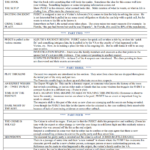 During this same struggle, I also searched the internet high and low for a mystery writing template that didn't use the hero's journey, and although I found a few, they were still too esoteric in nature. They all appeared to be built on the hero's journey in one way or another. None of them mentioned the crime, clue dropping or anything you commonly find in any mystery, mystery suspense, psychological mystery, or even cozy mysteries.
During this same struggle, I also searched the internet high and low for a mystery writing template that didn't use the hero's journey, and although I found a few, they were still too esoteric in nature. They all appeared to be built on the hero's journey in one way or another. None of them mentioned the crime, clue dropping or anything you commonly find in any mystery, mystery suspense, psychological mystery, or even cozy mysteries.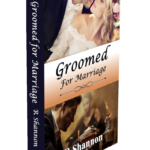 My pen name is R Shannon and I started writing in late 2019. I self-published my first novel on KDP on 10/01/2020. The name of it is Groomed for Marriage.
My pen name is R Shannon and I started writing in late 2019. I self-published my first novel on KDP on 10/01/2020. The name of it is Groomed for Marriage.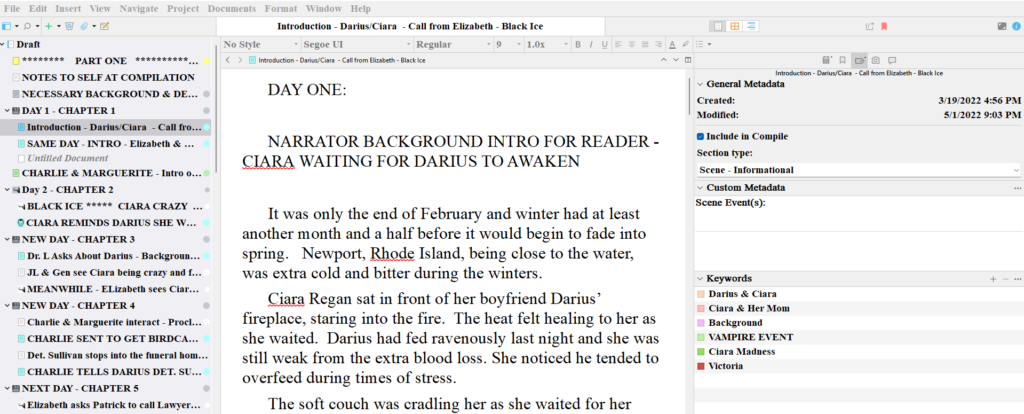
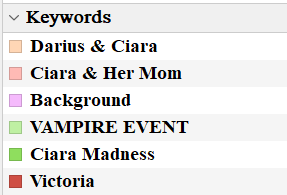 For this novel series, I use the keywords to allow me to name every relationship in the chapter. Then at the end, I can select only one keyword and track the character arc and/or the action in that plot or subplot. I didn't use keywords as a brand new writer, but I wish I knew this was a tool I could use. It is so very helpful. #writingstrategies
For this novel series, I use the keywords to allow me to name every relationship in the chapter. Then at the end, I can select only one keyword and track the character arc and/or the action in that plot or subplot. I didn't use keywords as a brand new writer, but I wish I knew this was a tool I could use. It is so very helpful. #writingstrategies